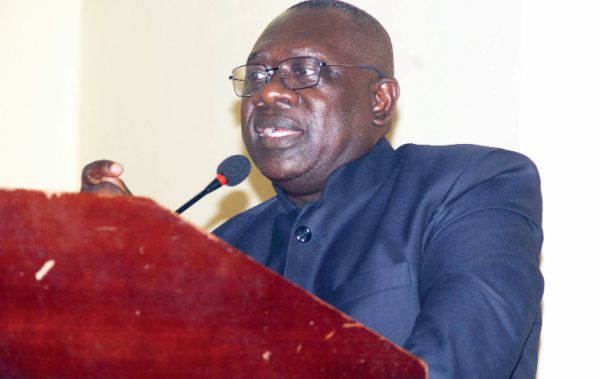
Rewrite Ghana’s Constitution New Year School recommends
Participants in the 70th Annual New Year School have called on the government to initiate steps to rewrite the 1992 Constitution of Ghana.
In a 19-point communique issued at the end of the school in Accra last Thursday, the participants were of the view that such an initiative would help strengthen the country’s institutions and consolidate its democracy.
Constitutional Review
The Constitution Review Committee, chaired by Professor Albert Kodzo Fiadjoe, was mandated to ascertain from the people of Ghana, their views on the operation of the 1992 Constitution and, in particular, its strengths and weaknesses.
The committee members were also to articulate the concerns of the people of Ghana on amendments that might be required for a comprehensive review of the 1992 Constitution and also make recommendations to the government for consideration and provide a draft bill for possible amendments to the 1992 Constitution.
After reviewing the major opinions from nationwide hearings and many memoranda, the committee presented its report in December 2011.
The government studied the report and stated its position on the recommendations in a White Paper issued in June 2012.
It then set up a Constitution Review Implementation Committee (CRIC) in October 2012 to implement the recommendations.
But a law suit in July 2014 challenging its constitutionality stalled the work of the commission until a favourable ruling in October 2015.
The ruling notwithstanding, the CRC's recommendations have still not been implemented.
Review of provisions
“The Constitution Review Committee at the end of its work recommended a review of 97 provisions of the 1992 Constitution, including 46 that are entrenched.
“We observe that this would require several referenda, leading to a piecemeal and more costly approach to amending the constitution,” the communique, read by Dr Samuel Amponsah, the Rapporteur General of the New Year School, and a Lecturer at the Department of Adult Education & Human Resource Studies of the University of Ghana, said.
Appointments
The communique also called for legislation to be made to limit the number of ministers that could be appointed by the President.
“The constitutional provision that more than 50 per cent of ministerial appointments should come from Parliament must be reviewed,” it said.
Article 78 (1) states that “Ministers of State shall be appointed by the President with the prior approval of Parliament from among Members of Parliament or persons qualified to be elected as Members of Parliament, except that the majority of Ministers of State shall be appointed from among Members of Parliament.”
Judiciary independence
On the independence of the Judiciary, the participants suggested that to ensure that judges appointed to the various courts had the requisite experience and competencies, the Judicial Council should be given absolute authority in the appointment of judges.
They further proposed that the Judicial Service should be allowed to retain 100 per cent of its internally generated funds (IGF) to finance its operations to offset delays in the release of its budgetary allocations.
Additionally, the participants called on the government to resource the constitutional anti-corruption bodies “and their appointed heads should be given a fixed term of office to guarantee their independence from political influence.”
They further impressed on the government to ensure that the Office of the Special Prosecutor be provided with adequate human and financial resources for the office to become fully operational, adding that the timely release of funds should be ensured for its operations.
The participants also stated that the independent governance institutions such as the Electoral Commission (EC), the Commission on Human Rights and Administrative Justice (CHRAJ) and the National Commission for Civic Education (NCCE) must be well resourced while budgetary allocations should be released on time for them to play their respective constitutional roles more effectively.
Role of journalists
On the role of journalists in building strong institutions for democratic consolidation, the participants recommended that for the sake of high journalistic standards and practice in the country, the National Media Commission (NMC) should set a framework for the conduct and practice of investigative journalism within the legal, social and ethical standards of the profession and international best practice.
“Given the important role that investigative journalism plays in exposing corruption in Ghana, the NMC should establish a fund to support capacity building and protection of investigative journalists,” they said.
They called on Parliament to pass the Right to Information (RTI) Bill without further delay, noting that access to information was critical to the fight against corruption in the country.
Vigilantism
They condemned vigilantism and called on all political parties to immediately disband their vigilante groups.
They recommended that persons engaged in vigilantism or hooliganism should be severely punished to serve as a deterrent to others.
The participants also urged the EC to take steps to fully digitise its processes and systems to minimise the propensity for human manipulation and ensure efficiency in their operation.